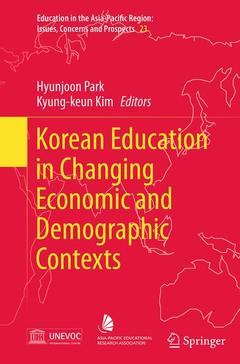Description
Korean Education in Changing Economic and Demographic Contexts, 2014
Education in the Asia-Pacific Region: Issues, Concerns and Prospects Series, Vol. 23
Coordinators: Park Hyunjoon, Kim Kyung-keun
Language: English
Subjects for Korean Education in Changing Economic and Demographic...:
Keywords
Education in South Korea; Educational Reform in Korea; Expansion of Education; Knowledge-Based Economy and Education in Korea; Korean Education; Multicultural Education in Korea; Parental Involvement in Children's Education; Performance of Korean Students; Traditional Model of Korean Education
Publication date: 09-2016
Support: Print on demand
Publication date: 12-2013
209 p. · 15.5x23.5 cm · Hardback
Description
/li>Contents
/li>Comment
/li>
This edited volume offers a comprehensive survey of Korean education in transition. Divided into three parts, the book first assesses the current state of Korean education. It examines how the educational system handles the effects of family background and gender in helping students smoothly transition from school to the labor market.
Next, the book introduces growing concerns over whether the traditional model of Korean education can adequately meet the demands of the emerging knowledge-based economy. It examines features of new reform measures that have been introduced to help Korean education prepare students for the new economy.
The third part discusses how an influx of diverse migrant groups, including marriage migrants, migrant workers, and North Korean migrants, and the rising divorce rate ? two major demographic changes? challenge the fundamental assumption of cultural homogeneity that has long been a part of Korean education.
This detailed analysis of a society and educational system in transition will appeal to a wide range of readers, from those involved with Korean education to educators and administrators in countries currently looking for ways to handle their own economic and demographic changes.
Current Contours of Korean Education
1. Determinants of Academic Achievement in Republic of Korea.
Kyung-keun Kim (Korea University) and Soo-yong Byun (Penn State University)
2. Shadow Education and Academic Success in Republic of Korea.
Soo-yong Byun (Penn State University)
3. The Analysis of Entering Labor Market among Women Doctorates in Republic of Korea.
Jae-Hee Ahn (Yonsei University)
4. Educational Expansion and Labor Market Entry of New Graduates in Korea and Japan.
Shin Arita (University of Tokyo)
Educational Reforms in a Changing Economy
5. Evaluations of Educational Reform Measures and Future Directions for the Knowledge-Based Society.
Hyunsook Yu (Korean Educational Development Institute)
6. Youth Key Competences in Korea.
Kihun Kim (National Youth Policy Institute)
7. Effects of Ability Grouping on Middle School Students’ Affective Outcomes.
Yeo-Jung Hwang (National Youth Policy Institute).
Demographic Changes and Educational Challenges
8. Single Parenthood and Children’s Education in Republic of Korea.
Hyunjoon Park (University of Pennsylvania)
9. Multicultural Discourse in Republic of Korea: Social Change and School Education.
Min-Kyung Lee (Daegu University)
10. Educational Challenges of and Support for Young North Korean Immigrants.
Yoon Young Kim (Korean Educational Development Institute)
Conclusion: Korean Education in Transition
Features 10 papers that examine recent changes in the economic and demographic environments of Korea and their effects on Korean education
Examines ways an educational system has sought to handle the challenges posed by rising immigration and the emerging knowledge-based economy
Places educational issues in an Asian society in a broad context of societal changes and their consequences — will be of interest to researchers and the general public outside of Korea in an attempt to understand their own educational systems in comparative perspective
These books may interest you

The Korean Developmental State 126.59 €

The Korean Developmental State 126.59 €


